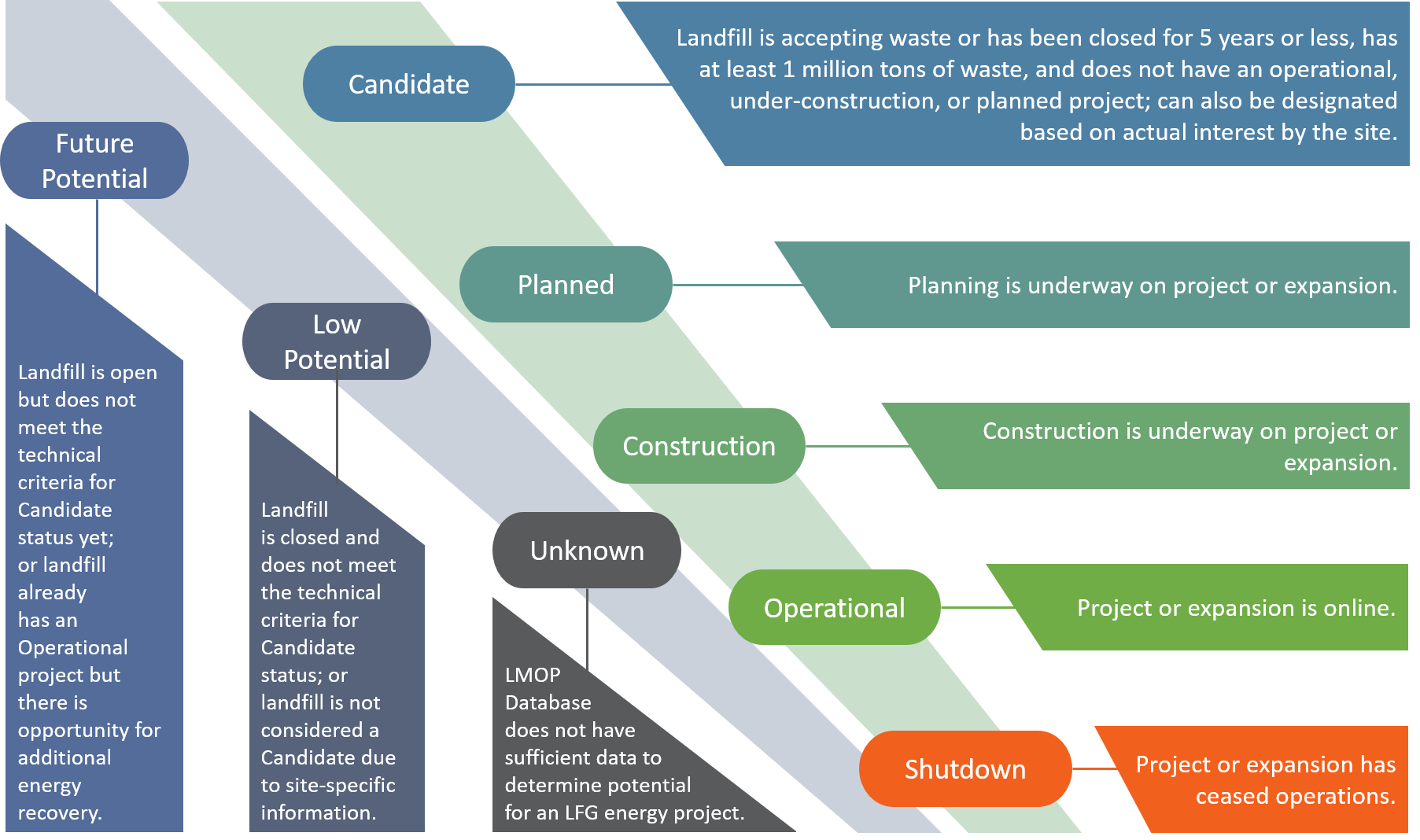LMOP Landfill and Project Database
- Access the Data
- About the LMOP Database
- Composite and Historical Data Files
- Project Status Definitions
LMOP tracks key data for municipal solid waste (MSW) landfills in the United States. The LMOP Landfill and Landfill Gas Energy Database (LMOP Database) is a data repository for more than 2,600 MSW landfills that are either accepting MSW or closed in the past few decades. This represents a majority of MSW landfills, but the LMOP Database does not include data for every MSW landfill in the United States, nor data for industrial landfills or hazardous waste landfills.
The LMOP Database also contains information about landfill gas (LFG) energy projects in various stages, such as planned, under-construction, operational and shutdown. As of September 2024, 488 MSW landfills provide LFG to one or more LFG energy projects currently in operation, for a total of 542 projects. EPA estimates that 444 additional "candidate" landfills could cost-effectively have their methane turned into an energy resource. Explore these projects and landfills on the LMOP National Map.
Access the Data
You can access spreadsheets of data from the LMOP Database in the following ways:
Key project data such as operational status, start date, project size and technology type, as well as project case studies
Pertinent landfill data such as location, operational status, design capacity and gas collection system status
Project and landfill data at the state level and a national map with counts by state
Greenhouse Gas Emissions Reporting
LMOP works closely with EPA’s Greenhouse Gas Reporting Program (GHGRP). For landfills that report under GHGRP, LMOP cross-references that dataset by including GHGRP’s 7-digit Facility Identifier.
About the LMOP Database
The LMOP Database contains key information about MSW landfills and LFG energy projects in the United States. LMOP publishes updated data on this website periodically (generally, two to three times a year) to enhance public access to information and support the development of LFG energy projects.
Information in the LMOP Database is compiled from a variety of sources, including:
- Information about LFG energy projects voluntarily reported to EPA by LMOP Partners under the authority of the LMOP Information Collection Request (EPA ICR No. 1849.09, OMB Control No. 2060-0446). Learn more about LMOP’s Partner voluntary data reporting.
- Data on MSW landfills submitted to EPA in response to the regulatory requirements of 40 CFR Part 98 - the Greenhouse Gas Reporting Program (GHGRP), Subpart HH. These data undergo verification and review processes as part of the GHGRP and are published annually. Note: not all landfills are subject to the requirements of the GHGRP (e.g., those below the reporting threshold). Learn more about EPA's GHGRP.
- Publicly available data on MSW landfills and LFG energy projects, such as news articles, press releases, reports, presentations and organization websites.
Data received for inclusion in the LMOP Database are reviewed for reasonableness and are corroborated via other data sources when possible. Not all data are updated each year. While the Program strives to keep the information as updated and accurate as possible, the database is not exhaustive.
The LMOP Database does not include data for every MSW landfill in the United States.
Composite and Historical Data Files
A complete composite file of landfill- and project-level data that are provided in other Excel files on the LMOP website is available for download. This file should not be used for summations of landfill- or project-level data as some data are duplicated when landfills or projects have more than one row in the file. For summation of project-level data for currently operational projects, use the Aggregated file of currently operational projects on the Landfill Gas Energy Project Data page; for summation of landfill-level data, use the Landfill-level data only file on the Landfill Technical Data page.
Download a free Excel spreadsheet viewer.
For historical data, LMOP has compiled one landfill- and project-level data file for each year 2001 through 2023, available for download:

